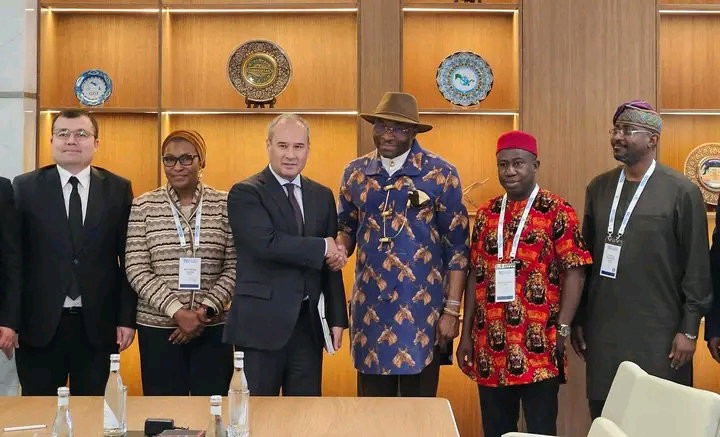Enhancing Nigeria’s Mining Sector: A Promising Collaboration With Uzbekistan’s Expertise
.......as Rt Hon Benjamin Kalu brainstorms with Uzbekistan's minister of mining and geology
In the ever-evolving landscape of global minerals and resources, the significance of local value addition, as opposed to mere raw material exportation, has become increasingly pronounced.
As countries worldwide strive for economic diversification and sustainable development, the integration of knowledge-sharing initiatives becomes paramount.
A notable recent occurrence in this regard was the productive meeting between Nigeria’s Deputy Speaker of the House of Representatives, Rt Hon Benjamin Kalu, and Uzbekistan’s Minister of Mining and Geology, Yusupov Ural Sadullayevich, during the 150th Inter-Parliamentary Union (IPU) Assembly in Tashkent, Uzbekistan.
Their discussions centered on collaborative opportunities to enhance Nigeria’s solid minerals and mining industry, with a particular focus on local value addition and job creation.
Nigeria is endowed with a wealth of solid minerals, including coal, limestone, gold, and iron ore, positioned within a diverse geological landscape.
However, the exploitation of these resources has historically been hampered by a variety of challenges, including inadequate infrastructure, corruption, and policy inconsistencies.
Unlike the oil sector, which has attracted significant foreign investment, the solid minerals sector has remained underdeveloped.
Therein lies the pressing need to transition from being a predominantly raw material exporter to a nation that actively engages in the processing and value addition of its mineral resources.
Uzbekistan, on the other hand, has long recognized the importance of local processing and value creation through its robust policy framework.
Following the dissolution of the Soviet Union, Uzbekistan's mining sector underwent significant reforms that focused on attracting investments and promoting domestic processing.
Recent years have seen substantial investment in industries that utilize these minerals, helping the country achieve notable successes in job creation and economic growth.
At the crux of Rt Hon Benjamin Kalu’s meeting with Sadullayevich was a willingness to share comprehensive experiences pertaining to mining practices, regulations, and local policies.
Uzbekistan emphasized its approach to value addition and how it has fostered a culture of domestic processing rather than exportation.
This perspective presents a compelling case for Nigeria, which can benefit from both policy insights and practical knowledge that Uzbekistan has gained through its own trials and successes.
The partnership could enable Nigeria to tap into Uzbekistan’s strategies for job creation through the establishment of processing industries.
Given Nigeria’s young and rapidly growing population, it is essential to create an economy that provides employment opportunities beyond the petroleum sector.
The proposed student exchange programs and training initiatives are crucial facets of the collaboration that could positively influence the future of Nigeria’s mining industry.
These programs can serve to build a skilled workforce that understands contemporary mining technologies, environmental management practices, and sustainable development tactics, which are essential in modern mining operations.
Such educational exchanges would ensure that Nigerian students are equipped with the relevant expertise to innovate and improve the local mining sector significantly.
By establishing trade partnerships and bilateral engagements, the collaboration goes beyond mere mining practices.
It reinforces diplomatic ties that have the potential to lead to further cooperation in various sectors, such as energy, telecommunications, and agriculture.
This broader relationship would not merely benefit the two nations economically but could enhance global cooperation on issues such as climate change and sustainable resource management.
While challenges exist, the significance of collaboration between Nigeria and Uzbekistan cannot be overstated.
Strengthening Nigeria's mining industry toward a more sustainable and value-added model could have far-reaching benefits.
Economically, it could provide a pathway to greater stability and independence from the fluctuating oil market.
Culturally, it could foster a sense of national pride and ownership over the country's resources—a shift from being historically seen as mere exporters to being recognized as valuable players in the global minerals market.
Moreover, fostering a culture of domestic processing reinforces the principles of sustainable development.
Emphasizing responsible mining practices not only ensures environmental stewardship but also aligns with global trends advocating for sustainability and ethical resource management.
Let me conclude by saying that the recent meeting between Rt Hon Benjamin Kalu and Yusupov Ural Sadullayevich has opened a new chapter in the narrative of Nigeria’s mining industry, one that emphasizes collaboration, knowledge transfer, and shared success.
By critically evaluating Uzbekistan's policy of local value addition, Nigeria stands at the threshold of transformative opportunities that offer a roadmap to economic diversification and job creation.
Nevertheless, adopting such a model is not without its challenges, and addressing these will require cooperative engagement among all stakeholders, from government entities to local communities.
Ultimately, the insights gained from Uzbekistan could lay the foundation for a mining sector that not only fulfills Nigeria’s vast potential but also uplifts its socio-economic landscape for generations to come.
As we look forward, it is imperative for Nigerian leadership to engage actively with Uzbekistan and other nations to pioneer a more sustainable approach to mining.
Through concerted efforts, a collaborative spirit, and the political will to effect change, Nigeria can chart a course towards a more resilient and thriving future within the global minerals economy. The time for transformation is now; the opportunities are ripe for the taking.
Stay tuned for more updates.
𝓘𝔂𝓴𝓮 𝓜𝓫𝓪
s.ʟ.ᴀ ᴅᴇᴘᴜᴛʏ sᴘᴇᴀᴋᴇʀ ʜ.ᴏ.ʀ







تعليقات
إرسال تعليق
For advert placing, call 08024114163